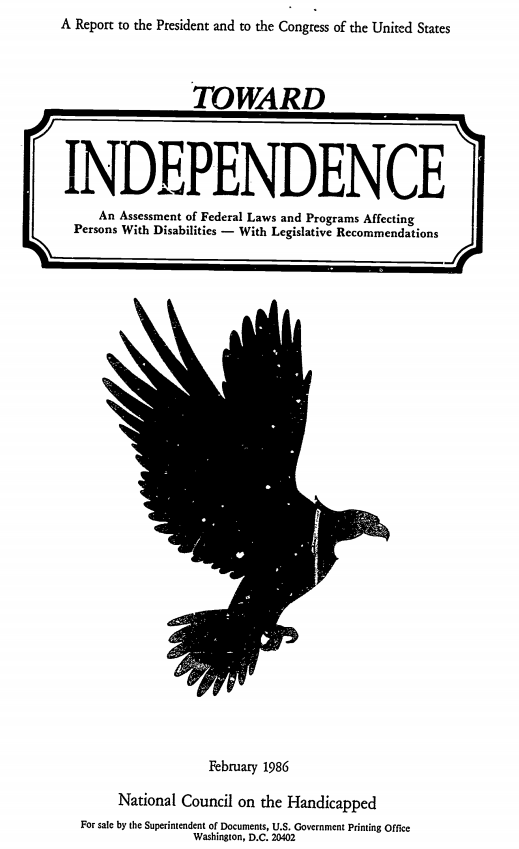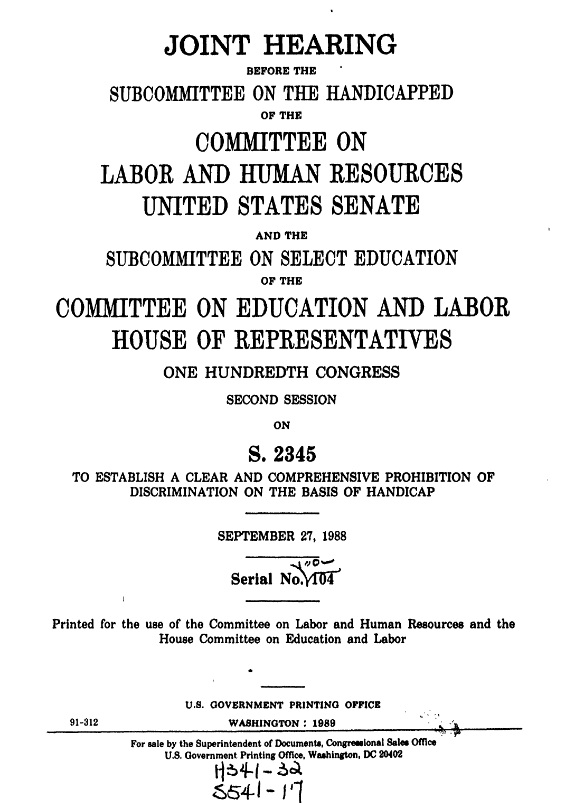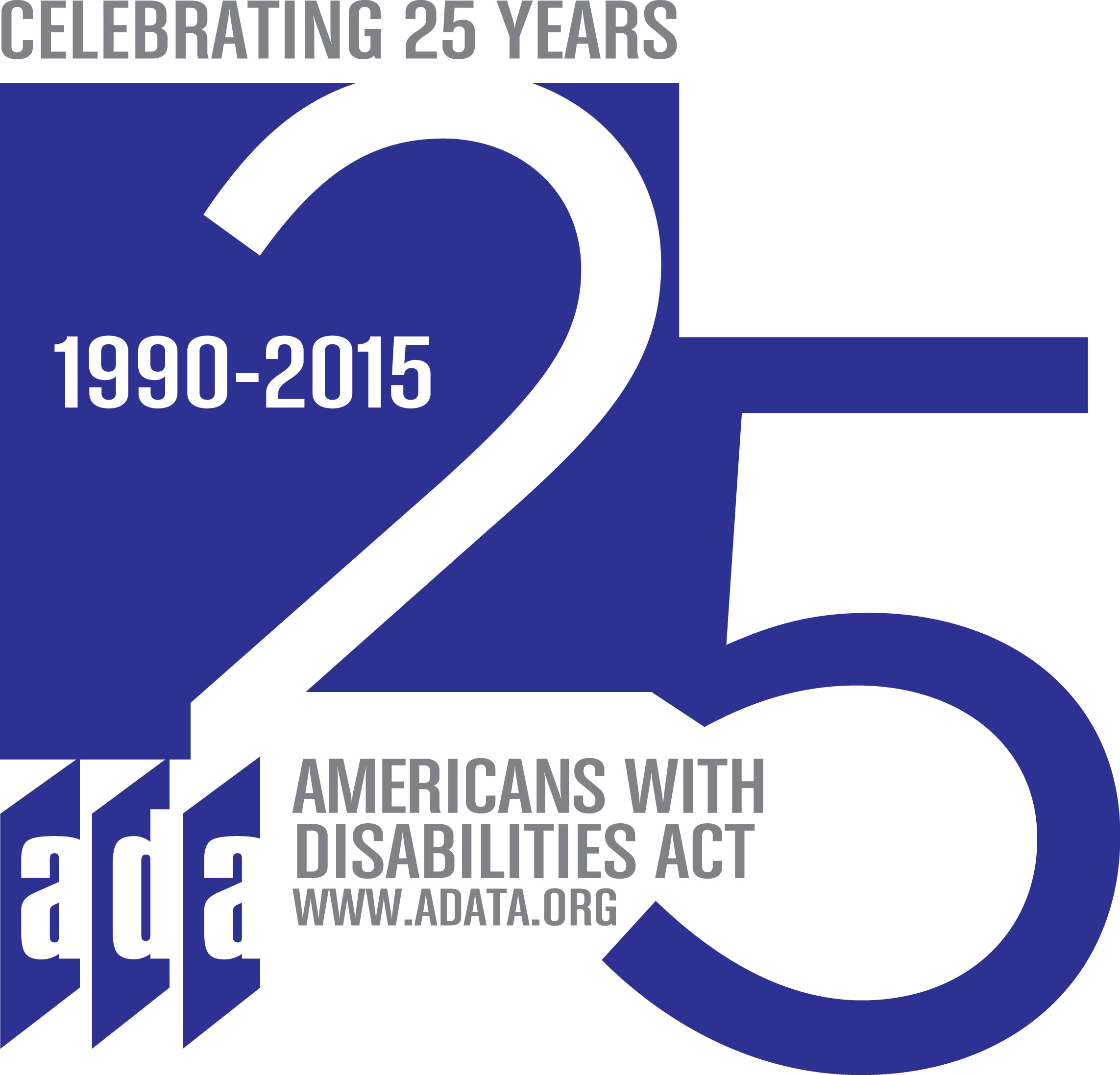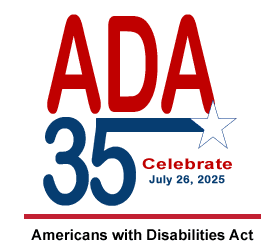

 [1]
[1]
The National Council on the Handicapped (now National Council on Disability, or NCD) issued its report Toward Independence [2]; legislative recommendations include enactment by Congress of a “comprehensive” equal opportunity law, “perhaps under such a title as ‘The Americans with Disabilities Act of 1986.’"
 [3]
[3]
The National Council on the Handicapped (now National Council on Disability, or NCD) issued its report On the Threshold of Independence [4].
The Congressional Task Force on the Rights and Empowerment of Americans with Disabilities was created by Rep. Owens, co-chaired by Justin Dart Jr. and Elizabeth Boggs.
The first version of Americans with Disabilities Act (ADA) was introduced by Sen. Weicker and Rep. Coelho in the 100th Congress.
A revised Americans with Disabilities Act (ADA) was introduced by Sen. Harkin and Sen. Durrenberger, Rep. Coelho and Rep. Fish in the 101st Congress.
The ADA passed the Senate by a vote of 76 to 8.
 [6]
[6]
The Americans with Disabilities Act (ADA) was passed and signed into law by President George H.W. Bush on July 26, 1990.
Regulations for Title I of the Americans with Disabilities Act (ADA) were issued by the U.S. Equal Employment Opportunity Commission (EEOC) [8].
Regulations for Title II and Title III were issued by the U.S. Department of Justice (DOJ) [9].
Transportation regulations for Title II and Title III were issued by the U.S. Department of Transportation (DOT) [10].
Regulations for Title IV were issued by Federal Communications Commission (FCC) [11].
Title I of the Americans with Disabilities Act (ADA) took effect for employers with 25 or more employees.
Title II and Title III took effect.
Title IV of the Americans with Disabilities Act (ADA) took effect.
Title I of the Americans with Disabilities Act (ADA) took effect for employers with 15 or more employees.
 [15]
[15]
The Supreme Court ruled in Sutton v United Airlines, Murphy v United Parcel Service, and Albertson’s Inc. v Kirkingburg (the “Sutton trilogy”), narrowing the definition of disability by holding that people who use “mitigating measures,” such as medication, may not be protected by the Americans with Disabilities Act (ADA).
The Supreme Court ruled in Olmstead v L.C., recognizing that the “unjustified institutional isolation of persons with disabilities is a form of discrimination” and holding that services must be provided in integrated, community-based settings when possible.
The Supreme Court ruled in Toyota Motor Manufacturing v Williams, further narrowing the protections of the Americans with Disabilities Act (ADA) by holding that the terms of the definition of disability “need to be interpreted strictly to create a demanding standard.”
National Council on Disability issued its report Righting the Americans with Disabilities Act (ADA) [18], urging the Administration and Congress to support legislation to restore the original intent of the ADA and counteract the Supreme Court rulings that had narrowed the scope of the ADA’s protections.
Revised transportation regulations for Title II and Title III of the Americans with Disabilities Act (ADA) (facility standards) were issued by Department of Transportation.
 [20]
[20]
The ADA Amendments Act (ADAAA) was signed into law by President George W. Bush to counteract the Supreme Court’s narrow interpretation of disability and provide broad protection from discrimination.
The ADA Amendments Act (ADAAA) took effect.
 [22]
[22]
Revised regulations for Title II and Title III of the Americans with Disabilities Act (ADA) were issued by Department of Justice.
Revised transportation regulations (passenger vessel operators) for Title II and Title III of the Americans with Disabilities Act (ADA) were issued by Department of Transportation.
Revised transportation regulations for Title II and Title III of the Americans with Disabilities Act (ADA) (boarding at rail platforms, miscellaneous) were issued by Department of Transportation.
Revised regulations for Title I of the Americans with Disabilities Act (ADA) were issued by the U.S. Equal Employment Opportunity Commission (EEOC).
The U.S. Access Board [26] is developing or updating guidelines for electronic and information technology, telecommunications products and services, public rights-of-way, passenger vessels, and medical diagnostic equipment; visit https://www.access-board.gov/ [26] for more information and watch for opportunities to participate in the rulemaking by submitting your comments.
Department of Justice is developing or updating rules to address web information and services, movie captioning and video description, equipment and furniture, and next-generation 9-1-1 services; visit https://www.ada.gov/newproposed_regs.htm [27] for more information and watch for opportunities to submit your comments.
 [28]
[28]
The 25th Anniversary of the Americans with Disabilities Act is July 26th, 2015!
Learn about the ADA Anniversary and how to participate. [29]
 [30]
[30]
Celebrate ADA 35 Years (1990-2025) Americans with Disabilities Act (ADA).
+ #ThanksToTheADA Campaign [31]
+ ADA Anniversary Tool Kit, Logos and Themes [32]
+ Add Your ADA 35 Event [33]
Links
[1] https://adata.org/ada-timeline/ncd-toward-independence
[2] https://ncd.gov/publications/1986/February1986
[3] https://adata.org/ada-timeline/ncd-threshold-independence-congressional-task-force-ada-introduced-100th-congress
[4] https://ncd.gov/publications/1988/Jan1988
[5] https://adata.org/ada-timeline/ada-revised-introduced-101th-congress-ada-passed-senate
[6] https://adata.org/ada-timeline/ada-passed-house-july-26-ada-signed
[7] https://adata.org/ada-timeline/regulations-issued-title-1-employment-title-ii-state-local-government-title-iii-public
[8] https://www.eeoc.gov/
[9] https://www.ada.gov/
[10] https://www.transit.dot.gov/civilrights/12325.html
[11] https://www.fcc.gov/trs
[12] https://adata.org/ada-timeline/effective-title-i-25employees-title-ii-title-iii
[13] https://adata.org/ada-timeline/effective-title-iv
[14] https://adata.org/ada-timeline/effective-title-i-15employees
[15] https://adata.org/ada-timeline/supreme-court-olmstead-supreme-court-sutton-trllogy
[16] https://adata.org/ada-timeline/supreme-court-toyota
[17] https://adata.org/ada-timeline/ncd-righting-ada
[18] https://ncd.gov/publications/2004/Dec12004
[19] https://adata.org/ada-timeline/updated-transportation-regulations
[20] https://adata.org/ada-timeline/ada-amendments-act-adaaa-signed
[21] https://adata.org/ada-timeline/effective-adaaa
[22] https://adata.org/ada-timeline/updated-regulations-title-ii-title-iii-more-updated-transportation-regulations
[23] https://adata.org/ada-timeline/still-more-updated-transportation-regulations
[24] https://adata.org/ada-timeline/updated-regulations-title-i
[25] https://adata.org/ada-timeline/pledge
[26] https://www.access-board.gov/
[27] https://www.ada.gov/newproposed_regs.htm
[28] https://adata.org/ada-timeline/celebrating-25-years
[29] https://adata.org/ada-anniversary
[30] https://adata.org/ada-timeline/celebrate-ada-35-years
[31] https://adata.org/thanks-to-the-ada-campaign
[32] https://adaanniversary.org
[33] https://adata.org/node/add/ada-anniversary-event